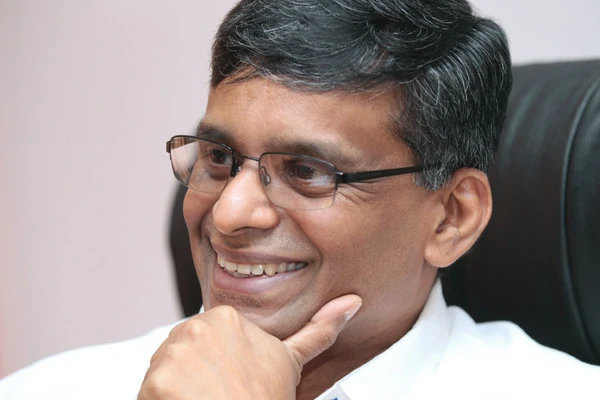
With over thirty years of experience in sales, advertising, marketing, human resources development and strategy, Deepal Sooriyaarachchi, former Managing Director of AVIVA NDB, has accumulated a wealth of business acumen over the years. Currently a member of the Board of Directors at AVIVA NDB, he also serves on the Boards of Hemas Manufacturing, Panasian Power and Sampath Bank, in addition to conducting leadership retreats for senior business executives and authoring a series of Sinhala language books on the practicalities of running a business. Deepal Sooriyaarachchi spoke about his latest books in the series as well as his work as a Management Development Consultant.
By Haseena Razak
Photography Menaka Aravinda
Can you elaborate on the subjects that your latest books address?
One of them is called “Rekiyawai Obai”, the seventh in the series, and aims to guide and orient beginners to a working lifestyle. It includes topics I used to cover during induction programmes when I was at Aviva Insurance. In the book, I discuss certain topics in a manner in which they are not normally addressed. I argue that the employee is a cost to the business unless he or she adds value to the company. Most of the time people are told that they are the biggest assets. That is true. But before one becomes a value, one is a cost to the company. Some people believe that leave from work is a right. In the book I argue that it is actually a privilege. It is a privilege offered so that employees can balance their work and personal lives. I also highlight the importance of staying loyal to one’s place of work even after employees have resigned. Additionally, I elaborate on the five ‘P’s of Professionalism, describing how one can maintain a sense of professionalism in whatever one does.
“Sathiyen Davasak” is the eighth in the series and is quite interesting. In this book I explore a topic that is not normally discussed in business circles – mindfulness. This is the ability to become aware of what you are thinking, what you are feeling and what you are doing in a deep sense. I believe, in today’s highly demanding, competitive world of work, your ability to know what you are doing and thinking is important in order to be effective. In the book, I try to distinguish between reactions and responses. I discuss that reactions can occur without any thinking involved – like knee-jerk reactions. However, a response arises from a process of thought. As such, one can experience a stimuli, think about the stimuli, become aware of it and then respond to it. If this kind of awareness can be achieved, one’s responses will be more balanced and appropriate.
The book includes about 10 to 15 simple exercises that help business executives practice awareness. For example, the simple exercise of walking can be used to train the mind to become aware of walking and thus the present moment. In another exercise, becoming aware of the taste, feeling and aroma of one’s morning cup of tea can also help bring one to the present moment.
Why did you want to discuss mindfulness in relation to business?
Why not? I have realised how I benefitted from applying mindfulness in my own career. It has helped me to be objective and think clearly in many challenging situations. Any business executive who develops this skill will certainly operate at a different level than his or her peers, and I have discovered that once one begins to develop mindfulness, it will endure. This is why I have included in the book practical exercises that will develop this ability, as people are too busy to make time for a retreat.
What were your reasons for publishing these books?
I started writing ‘Sinhalen Marketing’ articles in various magazines when I was in advertising during the 1980s. What prompted me to write was that I come from a rural background and saw that youngsters became involved in the insurgency of 1987-89 as they had very limited opportunities. English was one dividing factor for knowledge, and I felt it was not fair to expect them to learn English in order to obtain better prospects. This is why I decided to explain in Sinhala, things I had studied in English. Afterwards, once I had written to magazines for some time, I suddenly realised I had enough content for a book. That was how the first book “Sinhalen Business” came to be in 2000.
What are the different topics that the series has covered, thus far?
“Sinhalen Business” is perhaps the most comprehensive introduction to marketing in the Sinhala language. The second book was called “Paribogika Sathkaraya” and dealt with the area of customer service. The books that followed were on time management: “Kalayen Veda Genme Kalawa”, presentation skills: “Sabhaven Avasarai”, recruiting and training employees: “Sevaka Sampatha” and leadership: “Nayakathwaya”. I have also written a book for insurance executives titled “Rakshana Upadeshakawarayaneni”.
Did you expect such a huge response for the books?
Originally not. However, in the last ten years business has become complex and people realise that they need to learn not by experience but from other people. There is a huge amount of motivation towards learning, especially among medium and small-scale business people. Therefore, these books have received a good response. One touching incident sums up the entirety. I visited a successful businessman on his invitation and he introduced me to his staff as a partner of his success. I wondered how this was possible as I had only met him once before. Then he explained that he had read my books and used the information in them to train his team and develop his business.
One reason the books have been so widely accepted is that I realised the need to make them simple. People want to read things in simple language and short chapters. I found also that it was not easy to translate concepts, as the two languages are different in context as well as words. Sinhala is a more descriptive language than English. Therefore, I used that to its best advantage while writing the books. For example, the concept of positioning in marketing is difficult to understand as simply “sthanagatha kireema”. Therefore, to refer to ‘positioning’ I developed the phrase, “hithe thenak laba geneema”, which is more descriptive and easier to understand. Moreover, I have used simple everyday examples for readers to understand various concepts. Likewise, the headlines I have used are attention grabbing. Another reason the books have appealed to readers is the practical nature of the information. I am speaking from my own experience. Additionally, I address seemingly obvious issues and challenge my readers to look at them from a new perspective. I guarantee anybody who reads the books will look at their business slightly differently.
How do you help companies develop through your work as a Management Development Consultant?
I do this in many ways. I approach organisational challenges from a holistic point of view due to my broad spectrum of experience. I encourage organisations to look for creative solutions, define marketing strategies and align the organisation with those strategies.
This requires developing the capabilities of the management team, specially their leadership capability. Therefore, I link up people development strategy as a part of the business strategy. This approach brings in results fast and changes become institutionalised.
In developing leadership I emphasise the importance of developing mindfulness as a core capability. I do this through executive retreats. I prefer to conduct these retreats in places that are close to nature. If I were to illustrate how effective these retreats are, one senior executive was able to write a detailed piece about how the retreat had benefitted his professional life five years after he attended it. I have conducted these mindfulness development sessions even overseas with the RBL Group USA – co-founded by Dave Ulrich and Norm Smallwood, who appreciated the importance of my proposition and methodology.
Will you continue to publish more books for the series in the future?
Yes, there is more to come. At present, I am working on a book on conducting productive meetings, as a large amount of executive time is spent on meetings.
The series of Sinhala language books on Business Management are available at Sarasavi Bookshops






